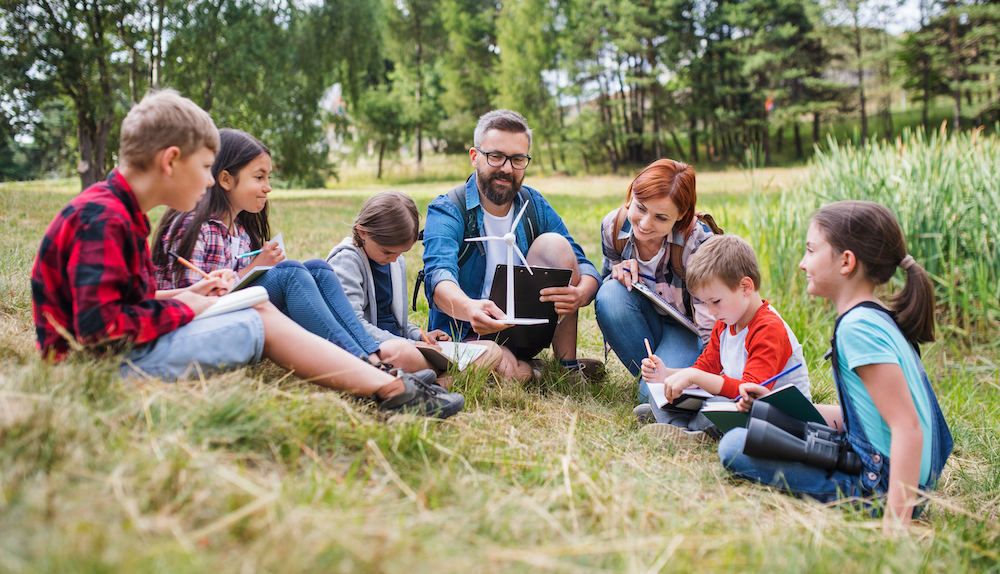Posts
Article
How should we talk about climate change in schools?
Posted on 12th January 2023

The effects of climate change are all around us, from Europe’s record-breaking winter temperatures to the 2022 Pakistan floods. It’s a vital concern for many of us. But do we focus on it enough in schools?
Research by Global Action Plan in 2020 found that 91% of students want their school to do more to engage with the climate emergency. 90% of teachers agreed that climate education should be a compulsory part of the curriculum.
But 70% of teachers feel they don’t have the training they need to properly educate children about climate change — and its implications, for the environment and our society.
Here at the Research-Engaged Practice Network we have been undertaking research into how to embed climate change into the school curriculum.
Vital for the future
Dr Richard Pountney is a senior lecturer at Sheffield Institute of Education. He says it’s vital that climate change is discussed in class — in fact, the future of the planet could rely on it.
‘We all know that children have great ideas, possibly the best ideas, and also an amazing amount of creativity,’ he says. ‘That’s why it’s important for us to work in schools to help young people respond to climate change.’
It’s a message echoed by the United Nations — Article 12 of the Paris Agreement emphasises the need to ‘empower all members of society to engage in climate action’.
So how can we ensure these conversations happen in school? And can this be a way of developing students into independent and freethinking citizens who take an active role in society?
Sheffield Hallam graduate Koen Timmers runs the Climate Action Project. Every year, he leads an international six-week programme in schools in 40 countries. Using a mix of CPD, webinars, guidelines and curriculum help for teachers, the project aims to change behaviour for climate change and improve skills like collaboration, problem-solving, critical thinking, empathy and creativity through education.
As part of the project, they have created a curriculum for climate alongside the World Wildlife Fund, including a climate literacy statement. ‘We need a specialised language to discuss climate change,’ says Richard. ‘Language and concepts are the raw materials of abstract thought.’
A local approach
Richard argues that for climate change education to be taken seriously by students, it’s important to address climate anxiety. This includes the feeling that a global challenge of this scale is simply too big to be meaningfully tackled by students.
‘The curriculum should reflect the concerns of society,’ he says. ‘And by involving children's ideas to solve problems in a local and regional context, we can start to see how to address climate change as a global problem — by first acting locally.’
The XP School Trust in Doncaster puts this idea into action. Driven by their leading principles of activism, leadership and equity, the multi-academy trust has developed a curriculum that focuses on three constant themes: the climate emergency, social justice, and diversity and belonging.
‘How are we making the world a better place? It’s an ambitious question for a school,’ admits chief academic officer Andy Sprakes. ‘A good place to start is your own local area. Our students do good work in the community. We see them as stewards of our community and of our school. And we’re also stewards of the planet.’
Every year, students take part in cross-disciplinary projects, which run throughout the usual subjects like science and geography. Students have created a field guide to their local nature reserve, made a documentary film about asylum seekers in Doncaster, and even written and recorded a charity song about the climate emergency.
‘The kids really remember what they've learned when they feel they are making an impact on the world,’ says Andy. ‘It makes them more powerful, gives them agency, and it unleashes their creativity.’
Climate education for all
Of course, to teach students about climate change you don’t need to come up with a completely new curriculum. Clive Belgeonne, Education Advisor at the Development Education Centre, South Yorkshire (DECSY), has worked with Learn Sheffield and Schools' Climate Education South Yorkshire (SCESY) to develop a strategic plan to support all schools to address the climate emergency.
'We want every teacher in Sheffield to be confident talking about the climate,’ says Clive. ‘We’re developing CPD for teachers and resources to prepare students for jobs in a low carbon economy.
‘The Department of Education says the challenges of climate change are formidable. Children must be given the hope they can be agents of change.’
Newfield School in Sheffield have been working with Clive’s team to include more climate education throughout the school.
Assistant head Paul Thornely says, ‘We established an eco committee with students, running across all the year groups. We have created a dialogue around climate change with themed days, assemblies, and displays. We have also launched schemes such as No Car Days and Meat-Free Mondays.’
Ultimately, the more students are talking about climate change and finding ways to make a difference, the more hope there can be for our collective future.
As Dr Richard Pountney says, ‘We need to be able to think to solve the world’s problems. And it’s essential that we proactively change the world through learning.’
Watch presentations from our recent event ‘Developing the school curriculum for sustainability and climate education’ here.
Comments
There are no comments for this post.
